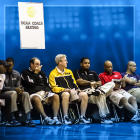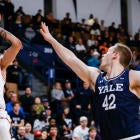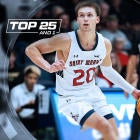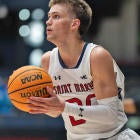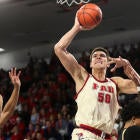CBS Sports college basketball writers Gary Parrish and Matt Norlander spent the July evaluation period at NCAA-sanctioned events, where they talked with coaches from all levels. They asked for honest opinions on players, coaches and issues in the sport. They'll be sharing those opinions over a three-week period.
Nothing is more common on the summer circuit than whispers about who's doing what to get a prospect. The stories are typically vague. But the point is always the same -- that somebody did something to ensure this recruit committed to that school. With that in mind, we asked more than 100 college coaches the following:
Is college basketball recruiting cleaner or dirtier than it was five years ago?
| Cleaner | 14 percent |
| Dirtier | 37 percent |
| About the same | 49 percent |

FIVE QUOTES THAT STOOD OUT
MY TAKEAWAY
As the poll shows, only a small fraction of coaches we contacted told us recruiting is cleaner today than it was five years ago -- meaning the overwhelming majority believe things are, at best, about the same and, at worst, well, worse. What's most interesting, though, is that almost everybody thinks the cheating is ... different.
Once upon a time, as the stories go, cheating was done with shoe boxes of cash. A booster might buy a car. A mom might somehow end up with a new living room suit. I mean, you've seen Blue Chips, right?
And, absolutely, I'm sure things still get done the old-fashioned way, in certain cases; it would be naive to think otherwise. But what we consistently heard from coaches is that cheating is now so layered and sophisticated at the highest levels of the sport that it's hard to pinpoint exactly who's behind what.
But somebody is usually behind something.
Most coaches acknowledged that.
And they told us the biggest difference between now and five years ago is that agents and shoe companies are influencing the decisions of elite prospects more than ever. Most coaches insist about 80 percent of the nation's top 10 players, in any given year, are already tied to an agent before they ever even step on a college campus because agents are often deeply connected to some of the top summer programs. Hypothetically speaking, of course, an agent might guide a prospect over which he has influence to a school that employs a coach he trusts with the understanding that the coach will protect the asset. Meantime, it's rarely a coincidence when a prospect who spends his summers playing for a Nike-funded team ends up on visits to Nike-sponsored schools. Same goes for kids with Under Armour connections. Same goes for kids tied to Adidas.
Which leads to the following question: is that really cheating?
Undeniably, these are ways in which coaches gain advantages on the recruiting trail. But what these types of deals often do is give coaches the ability to look in the mirror and swear they didn't cheat to get a prospect even when, deep down, they know they got the prospect because there were outside forces working for them.
Either way, recruiting will never be completely on the up and up.
Trust that.
As long as there are coaches getting paid millions of dollars to win, there will be coaches willing to do whatever is necessary to get the types of players it takes to win. It really is that simple. And the fact that many elite prospects come from less-fortunate backgrounds, combined with the fact that some are controlled by people who literally make their living hustling players, means a market will forever exist.
Bottom line, the cheating will evolve.
It always does.
But it's not ever going away.












